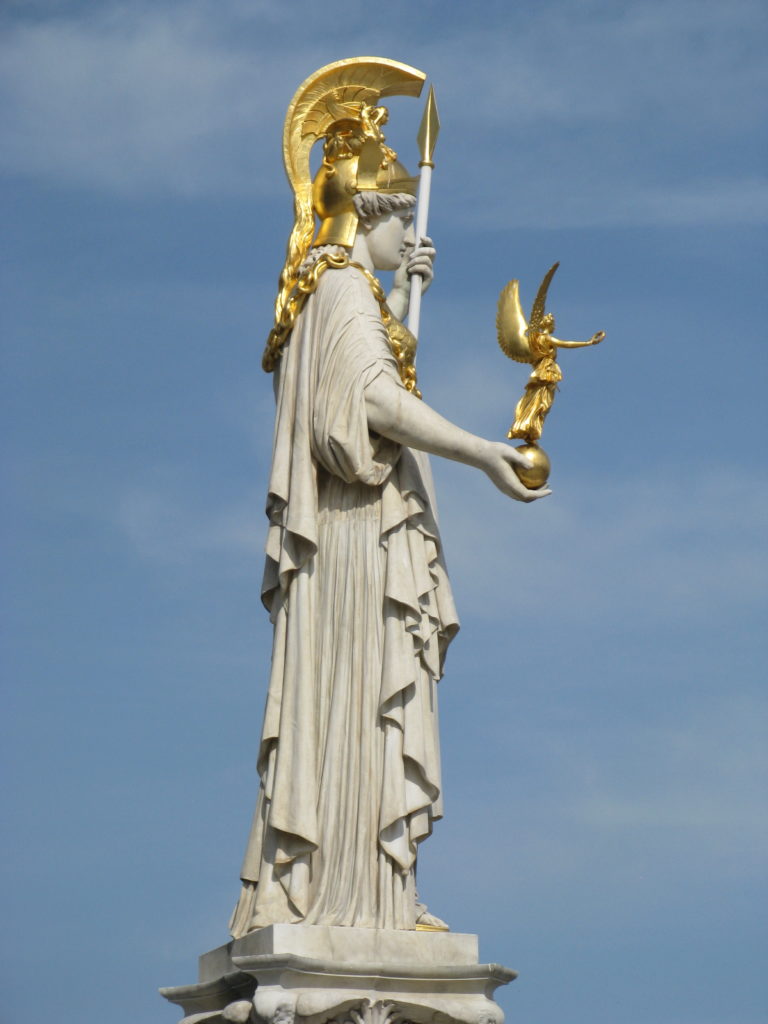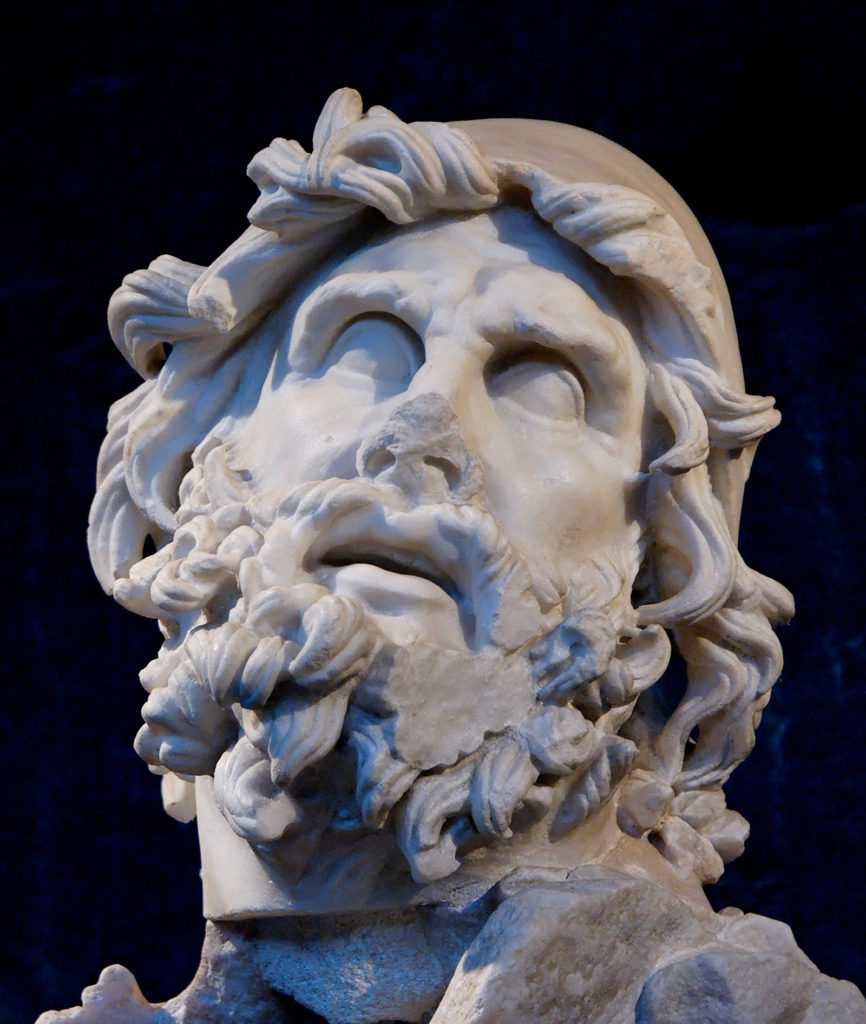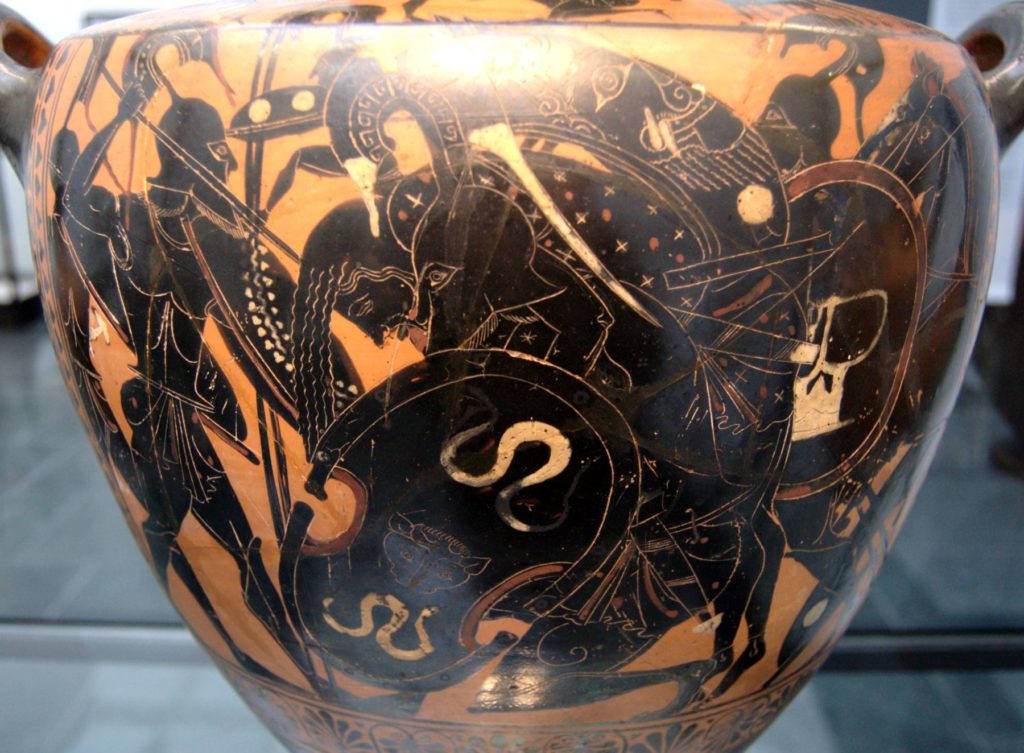
Pallas Athena
Forth on the Godly Seas
Darrell Sutton considers new translations of timeless texts
Barry Powell, Homer: The Odyssey (Oxford U. Press, 2014), xxv, pp 459
Peter Green, The Iliad: A New Translation (U. of California Press, 2015), xvi, pp 592
Since the moment that Aristotle penned his Homeric Questions and defended Homer from his detractors there have been supporters and opponents of various Homeric views. Of all extant Greek writers in antiquity Homer certainly stands apart. The two main poems attributed to him, the Iliad and the Odyssey, served as models for later Greek and Roman writers. Homer’s biography cannot be soundly reconstructed; but his poetic texts are rich in historical detail, and the nuances in each phrase elicit varied sentiment and strong emotion. It is no wonder that cinematic productions draw vast crowds.
The adage that ‘hindsight is 20/20’ is not entirely accurate. This is visible now in the convoluted arguments regarding the so-called ‘Homeric Question’ (in reality there is more than one query): e.g., were the Iliad and Odyssey written by one person or several persons? Which of the two poems was written first? Which passages truly are authentic and which of them are interpolations? How much of either of the poems is an adaptation of Mesopotamian lore?
Ancient Greeks did evince a knowledge of various influences, but they cited Egyptian effects more so than those of the ancient Near East. Accomplished classicists tend to ignore this fact, by being unacquainted with or unable to control Egyptological data. It is an ailment which must be remedied. This is a skeptical age: scholarship in all fields of study moves forwards, backwards and sideways by means of reconsideration and revision.
Thankfully those are not questions or problems that overburden readers of these two books. The load would be too much for non-specialists. Powell and Green are both aware of current discussions in Homeric scholarship. These debates are noted in their introductions. They make many plausible suggestions; except the critical discussions relating to secondary literature are not necessary, however, for the making of verse-renditions, other than that a translator must know Greek and something about the age in which the poems were composed. The authors have issued translations which give modern readers similar impressions an ancient reader might have felt while poring over the Greek text.
Professor Powell’s volume appeared first, although he published his version of the Iliad in 2013 and Vergil’s Aeneid in 2015. In the Odyssey he disallows fanciful ideas, i.e., that Homer never existed or that his poetry was the creation of a committee of ancient editors. In that regard he keeps the train on the rails. He strongly believes the Greeks crafted their alphabet in order to preserve literature (see his book Homer and the Origin of the Greek Alphabet, 1991). Homer’s works, of course, were the foremost prizes of all Greek writing.
Powell’s theory is unconventional, but it is a result of measured thought, and it is not completely out of step with the material record we have of the development of scripts in other civilizations. Even so, it will be a long time before his thesis can be ignored in serious Homeric scholarship.
Ian Morris wrote the Foreword. It is a fine historical overview of Homerica in only 4 pages. After a briefer preface by Powell, there is a 36 page Introduction, broken up into small sections: ‘The Difficulty of Homer’ (pp.1-3); ‘Who was Homer’ (3-5); ‘The Text of Homer’ (5-6); ‘The Alexandrian Vulgate’ (6-7); ‘Before and After the Vulgate’ (7-8); ‘The Homeric Question’ (8-10); ‘The Oral-Formulaic Theory’ (10-13); ‘The Oral Style’ (13-14); ‘Homer and the Alphabet’ (14-17); ‘The First Text of Homer’ (17-21); ‘Homer and History’ (21-26); ‘The Homecoming of Odysseus’ (26-30); ‘Mythic Patterns in the Odyssey’ (30-32); ‘The Singer Sings’ (32-33) and ‘Translation Issues’ (33-36).
As is obvious, a lot of ground is covered rapidly. The font-size is small enough that the reader will not wander away feeling that too little was provided. Powell is conservative in his interpretative approach to Homer’s text. That is not a criticism of his way of thinking. He argues (p.10):
“It is extraordinary that after two hundred years of argument, not one single line of Homer’s poems the Iliad and the Odyssey can be proven to be an addition to the original text (which, in any event, cannot be reconstructed).”
It is quite refreshing to have a version in which multitudes of lines are not deleted, a text that is not swarmed by original but improbable textual details. In fact his explicatory notes are terse and informative:
e.g., at p.67, n.37: “fetish: The Greek is aegis, which means “goatskin,” maybe in origin either a shield or a “medicine” bag containing power objects. In Homer, the aegis is an object that inspires terror. In art somewhat later than Homer, the aegis has become a cloak with snake-head tassels and a Gorgon’s head in the center, worn more by Athena than by Zeus (see figures 2.2, 13.2).”
There are scores of others like the one above. Page after page is supplied with the right amount of data needful to grasp the terms used by Powell and Homer. Illustrated art is interspersed throughout the text, to which select-notes refer the reader at times. Powell is clear-headed, a scholar of deep knowledge whose encyclopedic ability helps him to keep ancient near eastern materials at his fingertips. So wide-ranging is he that his footnotes display more than a passing fancy with the intricacies of ancient myth and rudiments of Egyptology.
For a text as formidable as is Homer’s, large swaths of scholarship must be mastered. This is done well by him, and readers will do well to return to this book often. W.H.D. Rouse (1863-1950) once stated that ‘the Odyssey was the greatest adventure story ever told.’ Doubtless, supporters of that view are not hard to find. Once upon a time Homer was read to instill ethical values in pupils; sometimes answers to modern problems still can be found in ancient texts. But it has been a long time since any scholar utilized Homer as an educational tool for such purposes.
Powell does not go so far; on the other hand, he does know from personal experience of the “lifelong passion” induced in him in his youth from acquiring a small bit of information about Homer’s long books. Therefore in his translation Powell says he sought “to communicate in a lean, direct manner what the Greek really says, to put in English how Homer in Greek might have sounded to his contemporaries” (p.xv). The power of Powell’s expressive language can be seen in the following extended extract of a dialogue between Odysseus and Athena on their conspiracy to take vengeance on the badly-behaving men who now occupy his home during his long absence (book 13: 348-376):
The goddess flashing-eyed Athena was first to speak:
“Son of Laërtes, of the line of Zeus, resourceful Odysseus,
consider how you will place your hands on the shameless
suitors who for three years have been lording it in your halls,
wooing your godlike wife and giving bridal-gifts. She, ever
mourning for your homecoming in her heart, gives hope
to all and promises to each man, sending them messages.
But her mind dwells elsewhere.”
The resourceful Odysseus spoke in reply to her: “Yes, I might have perished in my halls by the same fate as Agamemnon, the son of Atreus, if you
O goddess, had not told me all this! But come, let us weave
a plan so that I might take vengeance on them. Now, you yourself
stand by my side and infuse me with a bold power, such as
when we loosed the shining veil of Troy. If you were to stand
beside me with similar enthusiasm, O flashing-eyed one,
I would fight against even three hundred men—with you,
revered goddess, if you would come to my aid with an eager heart.”

Head of Odysseus
Then the goddess flashing-eyed Athena answered:
“I will be very much with you when we are busy with
this work. And I think that many of the suitors who devour
your substance will spatter the vast earth with their blood
and their brains. But come, I will make you unrecognizable
to all mortals. I will shrivel the beautiful flesh on your
supple limbs, I will destroy the blond hair on your head
and cover you in a rag so disgusting that seeing a man
wearing it would make you shudder. I will dim your two
eyes that before were so beautiful, so that they appear
a disgrace to the suitors, and to your wife and child
whom you left behind in your halls.”
Athena is mischievous, as is Odysseus; but she possesses something he does not have, power. Powell controls their fervor with a language that is not haughty or undignified. He accomplished his goal of reproducing the qualities of Homer’s language. In over 12,000 lines, he strikes the right tone more often than not. George Chapman (1559-1634) published his edition of the Iliad in its entirety in 1615. Since then, according to Powell, more than 130 translations have appeared (p.35). Professors, lay-persons and undergraduates should be happy to count this one among that number as well.
At book’s end is a Bibliography followed by Credits for the illustrations. A Pronouncing Glossary/Index terminates the volume.
Professor Green’s Iliad bears all the qualities which have marked him as a first rate scholar/translator for over five decades. He has translated Greek and Latin texts, e.g., The Argonautika by Apollonios Rhodios, 1997 and The Poems of Catullus: A Bilingual Edition, 2005. His odyssey with Homer began too in his youth, stating in the Preface that by age fifteen he had read cover-to-cover the Iliad (3rd ed.) of Monro and Allen.
Translations of the Iliad will take a great leap forward now that this one is in the marketplace. It lacks all the pizzazz of Powell’s version since there is no artwork, having only 2 ineffective maps. Indeed the book’s presentation is much more scholarly. There is a 42 page synopsis of all the books of the Iliad, a 50 page select glossary and a select bibliography, even an index that when taken altogether make it better suited for research. It is all user-friendly and it was a pleasure to acquaint myself again with so many terms whose meanings fled from me years ago.
In the superb 25 page introduction, Green is at his literary best. The writing is lucid and eloquent. His introductory outline is easy enough to follow. ‘Approaching the Problem’ (pp.1-6); ‘The Myth Examined’ (6-11); ‘Preserving the Past: History and the Epic Tradition’ (11-18); ‘Translation and the Homeric Hexameter’ (18-24). He does not tread a pathway that is any different from the one he traversed in his other scholarly pursuits: his approach is non-traditional. This can be off-putting to some who are less interested in secondary literature, but who desire to know what a translator thinks about certain matters.
Dr. Green does not fail to unveil his thoughts: e.g., in an initial statement on page 1: he is less confident than others in a unitary authorship of both Iliad and Odyssey; but he gives a fair view of the one he imagines authored both poems on page 11. What’s more, I doubt if he believes that the management of all that data is critical to the understanding of the Greek text. From there he proceeds to survey the cause of the Trojan War. The critical road taken by him ensures it will be of use in college and university classrooms. There are hardly any explanatory notes.
In 2004 he published a collection of his essays entitled From Ikaria to the Stars: Classical Mythification, Ancient and Modern Few scholars have delved into mythic history with similar energy and penetration. His understanding of Homer’s thoughts, when one reads the Greek alongside the translation, clearly assigns him a place as a Master-teacher. The translation is his chalkboard. On it is written, with much detail, English transformations of Homer’s “wonderful compendium” (p.14). With much to learn, we hasten to read the first 19 lines that he gives of book 4:
The gods, seated by Zeus, were gathered together
on the golden floor, and among them the lady Hēbē
was pouring them nectar, and they with their golden cups
pledged one another while gazing out at the Trojans’ city.
Now the son of Kronos was minded to irritate Hērē
with taunting remarks, and said, speaking deviously:
“Two goddesses, no less, Menelaӧs has as his helpers—
Hērē of Argos and Athēnē the Defender.
But they sit here at a distance, getting enjoyment only
as onlookers, whereas Aphrodītē, lover of laughter,
stands by her man, protects him from the death spirits—
indeed, just lately she saved him when he thought he’d die!
Still, the victory must go to warlike Menelaӧs,
so we should be figuring out how these matters shall be:
are we once more to stir up vile warfare and grim fighting,
or rather to bring about friendship between the two sides?
If this last choice should turn out welcome and pleasant to all,
then might King Priam’s city remain inhabited,
and Menelaӧs go home, taking Argive Helen with him.”
The council of the gods must determine if war is the best way forward, and consider the implications of all decisions made by them. This may be an important learning-point: for it would be better if leaders in the West would acquire and keep the Iliad nearby for reference during official conferences on the necessity of international confrontation. Hardly ever nowadays are any bad translations of Homer’s texts published. Green’s Iliad is a translation to take up during long intervals wherever reading is an enjoyment. Favorable impressions emerge while one encounters the text. It is not Greek, but it is close to it, and every bit readable as Lattimore’s 1968 edition of the Iliad.

Ajax Carries the Body of Achilles
The publishers have my thanks for providing these two volumes. Homer has been a friend to me through many years. Often I had read him in bygone days with a fellow classicist, now deceased. Admittedly, Homer’s texts are nothing less than deeply religious at their core. Scholars fall short of manifesting the whole truth when they neglect to say so to modern readers. It is true that everyone in the ancient world did not interpret the Iliad and Odyssey as sacred documents. However, the Iliad did become a first-reader for many individuals. Children heard tales from its pages; young people learned several virtues of life from it.
Few texts rival it, sacred or profane. Beowulf is the great work of Anglo-Saxon literature and yet has its many fans. The One Thousand and One Nights is a fascinating collection of tales, until now read and recited in the east. Dante’s epic The Divine Comedy and even The Faerie Queen are works of genius, and each retains its popularity; Moby Dick is considered a masterpiece of epic proportions by some persons. But here is the question: do all these other “classics” lift the human spirit in the way that Homer’s texts do? – Well, that is for the reader to decide!
I think it best to conclude with Green’s final exhortation to readers (p.23-24) on why he failed to explain the poem’s many literary qualities:
“It is because a lifetime devoted to teaching of one sort or another has shown me that initial impressions are crucial, and that these are imposed externally, they can never be shaken off. First time readers of the Iliad should be allowed to establish their own personal impression of it before listening to the competing chorus of professionals, who are all too ready to shape their opinions for them.”
Darrell Sutton is Rector of the Tabernacle in Red Cloud, Nebraska, a small village in the Great Plains. He also teaches Semitic languages and edits an academic bulletin entitled ‘The DS Commentary on Books’











There ought to be a University of the Internet with a counter-PC Course on Dead White European Males, and Homer would be an excellent starter.